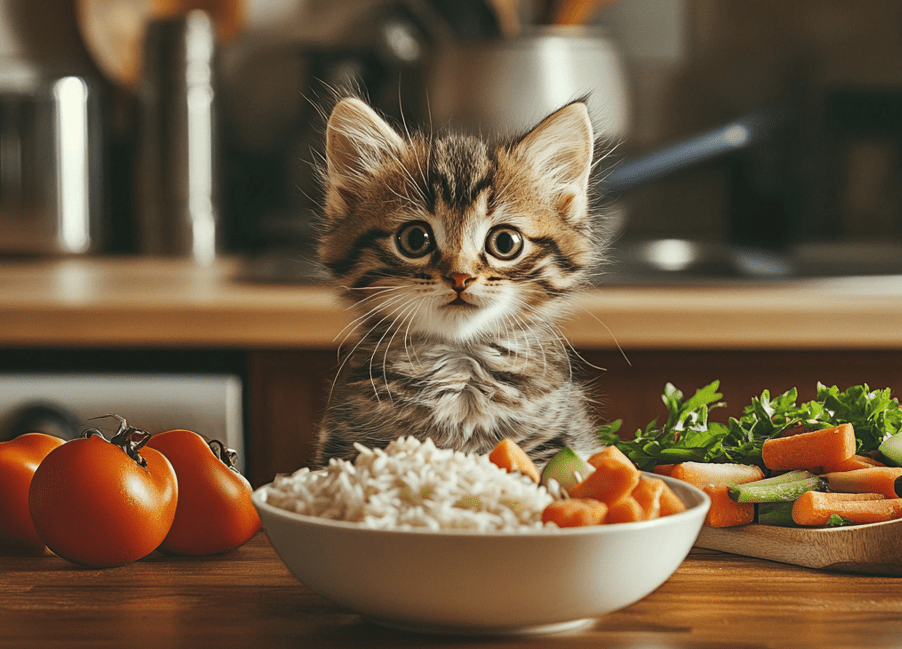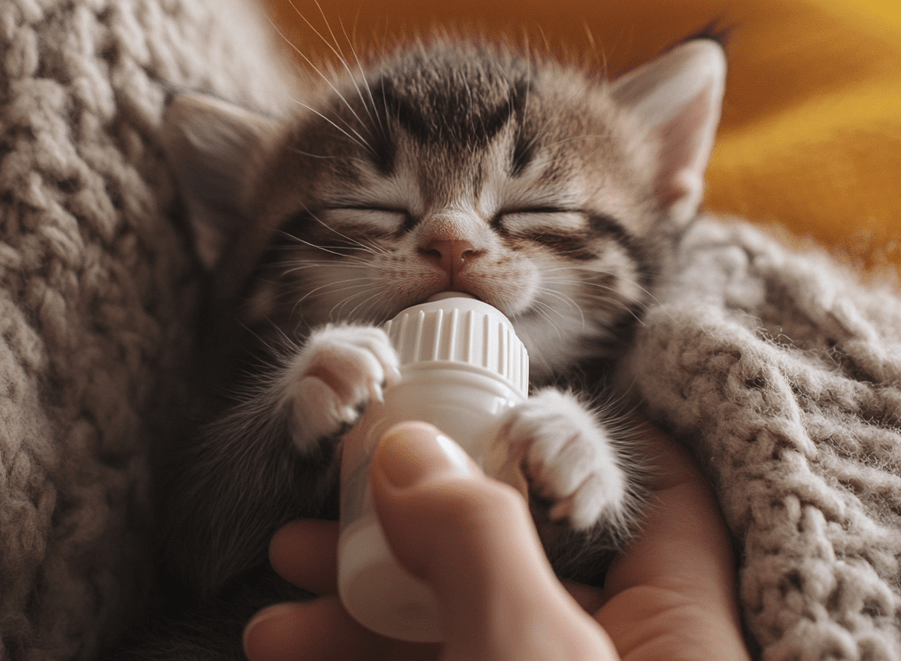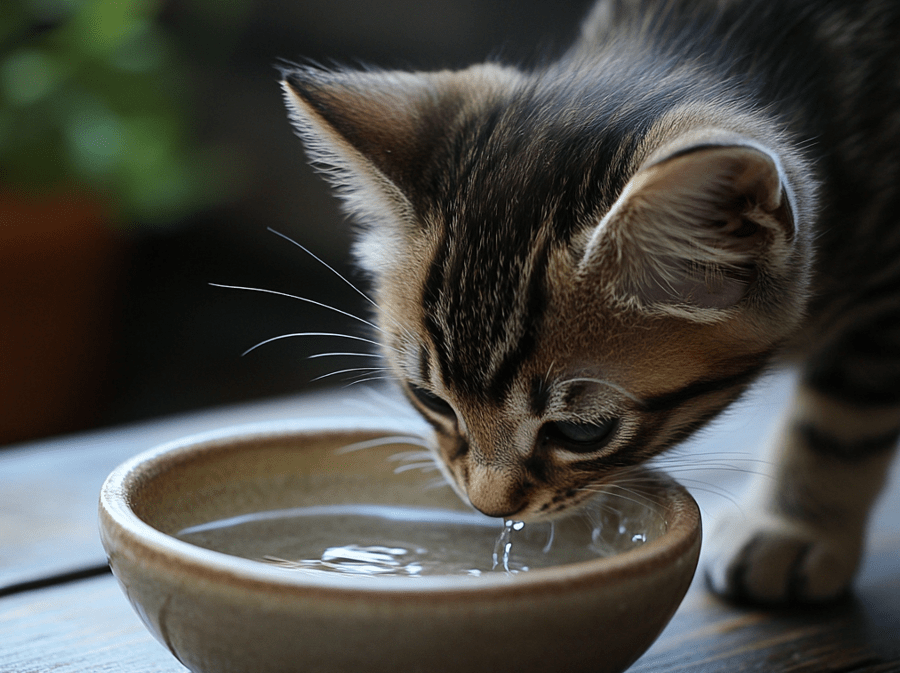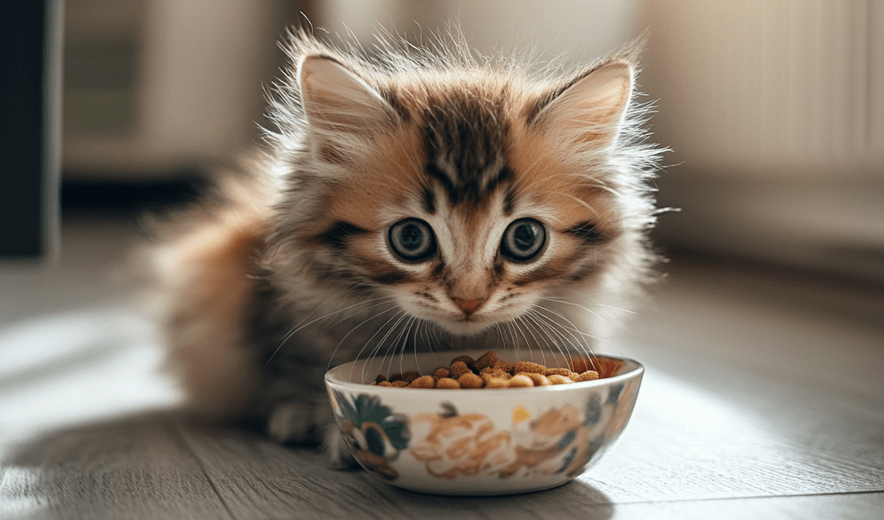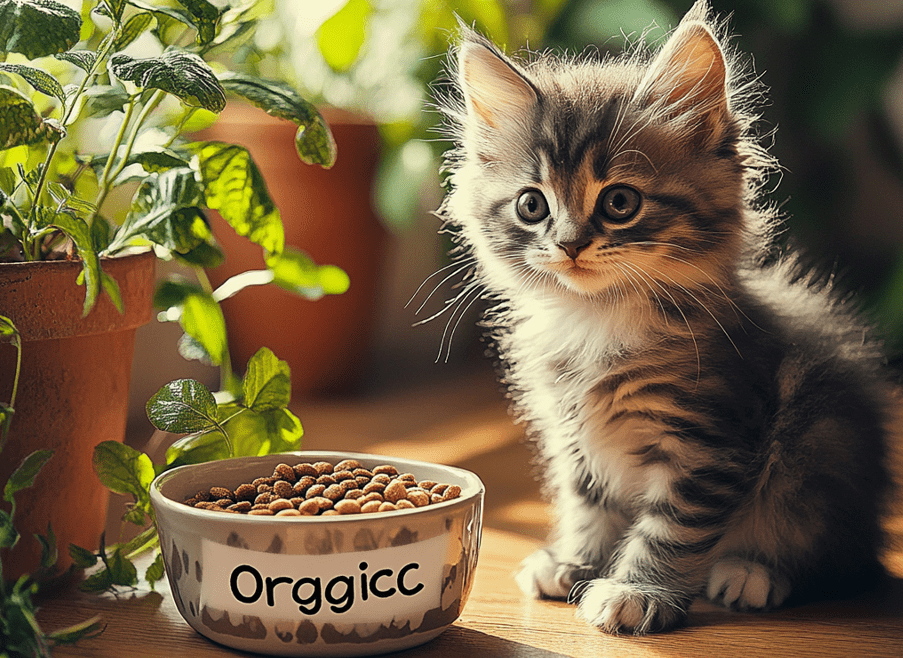
Choosing the right food for your kitten will ensure they grow properly and stay healthy throughout their life. Being obligate carnivores, cats require a high in animal-origin protein diet and you must pay careful attention to selecting a diet for kittens that meets these nutritional requirements. Though organic kitten food is growing rapidly among pet owners, the goal should be to offer a diet that is rich in variety.
This post looks at what organic kitten food is, why it matters, and the benefits that you can receive by giving it to your kitten. We also point out the risks of non-organic alternatives, what are the needs of a kitten according to their peculiar diet and what characteristics you should take into account when selecting the best organic cat food.
To watch the summary of this article, just watch this video-
What Is Organic Kitten Food?
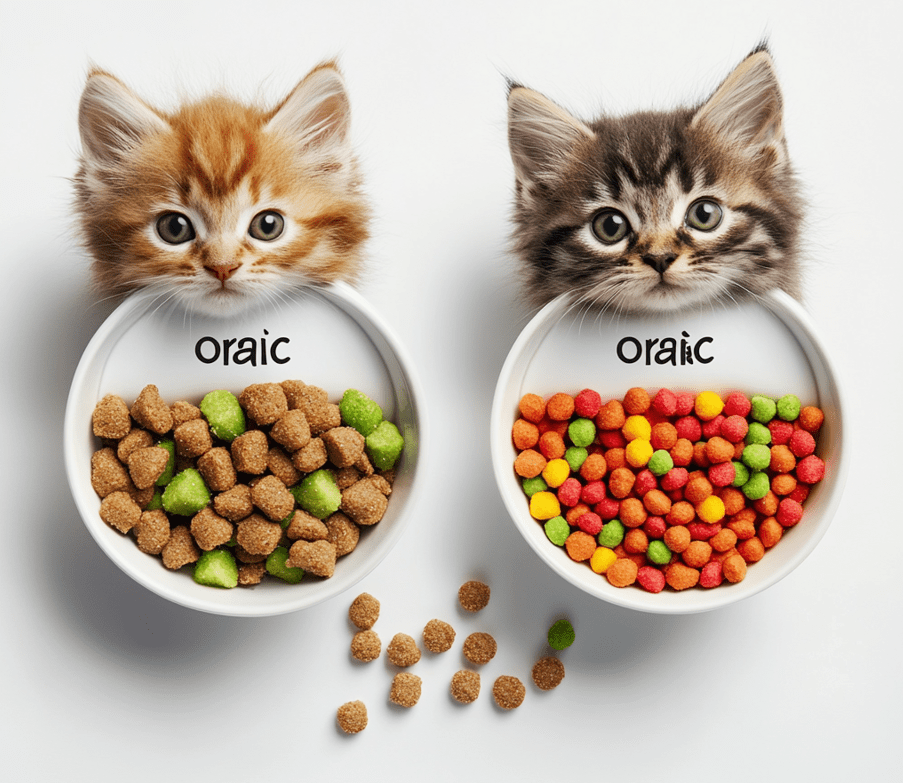
Organic Kitten Food: This is commercial cat food produced specifically for the dietary requirements of kittens and made using only ingredients form certified organic sources. By forgoing harmful additives and putting a push on superb sources of protein, Blue Buffalo is perfect for anyone caring pet parents who want to give their kitty the best they can. But these are all things to be aware of — organic food does not mean the lack of allergens or toxins, organically tasty, and there can be variations between brands.
Additionally, organic kitten food circumvents potentially controversial ingredients common to non-organic cat foods, like harmful PFAS chemicals and glyphosate herbicide, leading to healthier glimpses for kittens. After learning about the one-of-a-kind characteristics of organic kitten food, you can begin to think through how this applies to your kitten and its dietary needs including ingredient sourcing and quality control.
Why Is It Important To Feed Your Kitten Organic Kitten Food?
Organic kitten food is highly recommended for supporting the natural growth of your pet and consequently one of the best nutritional choices available. Organic cat food has all of the benefits in comparison with standard options, because it incorporates elements that high-quality organic ingredients are frequently recommended by veterinary experts.
In addition, environmental toxins such as glyphosate and toxic PFAS chemicals that are linked to a number of health conditions in cats are not present in organic-made food. To keep our cats happy and healthy in the long-term, natural food is good, but always check that organic products are complete nutrition cat food.
The Benefits of Organic Kitten Food
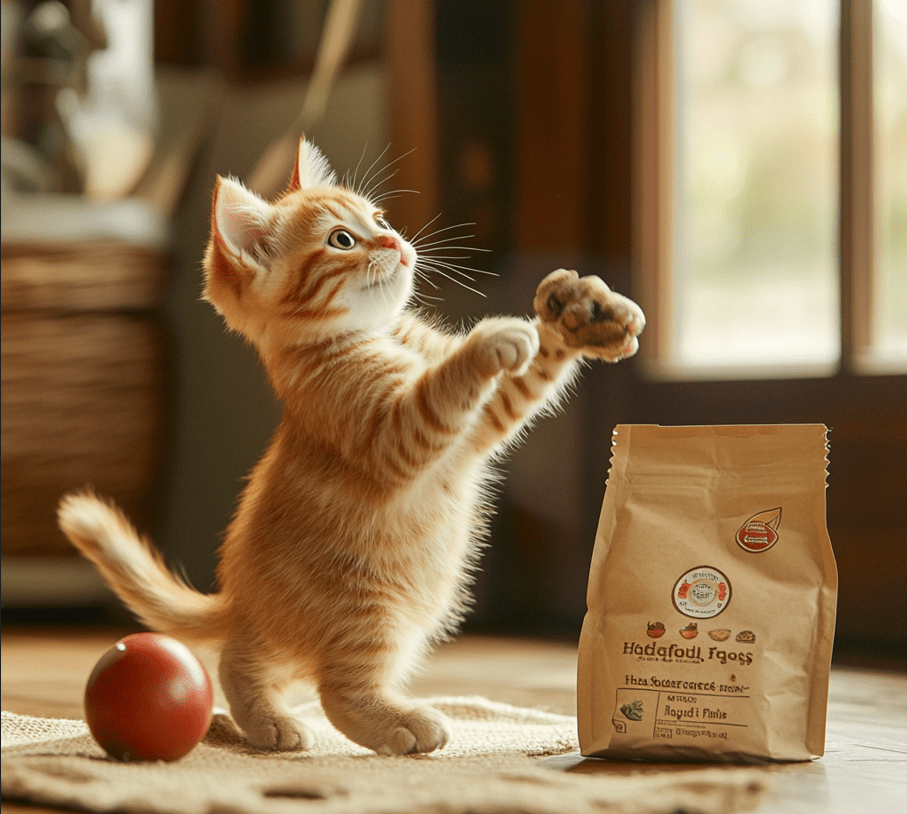
There are many benefits to feeding your kitten organic food including:
- Improved Nutrition: Organic cat food often includes highly concentrated ingredients, with proteins of a better quality — nutrition which can help your kitten to grow smarter and stronger.
- Veterinary Advocacy: Organic food is preservative-free, has fewer artificial additives and some veterinarians believe that this reduces risks to the cat’s whole nutrition.
- Better Nutrient Absorption: In some sense, kittens may absorb more nutrients from organic options which in turn mean they benefit more from important vitamins and minerals while eating the same portion as a non-organic diet.
- Fewer Allergens: Organic foods are less likely to cause toxic digestive or allergy-related reactions which help your body digest and utilize its nutrients more efficiently.
- Delicious Taste: Due to being grown and treated with natural chemicals, organic foods have more taste, which is able, the appeal to fussy eating children helping them towards a healthier lifestyle from an early age.
Together they lay a strong foundation for life-long health. But remember to monitor your kittens weight and feeding habits, overfeeding is not an excuse for him to be overweight.
The Dangers of Non-Organic Kitten Food
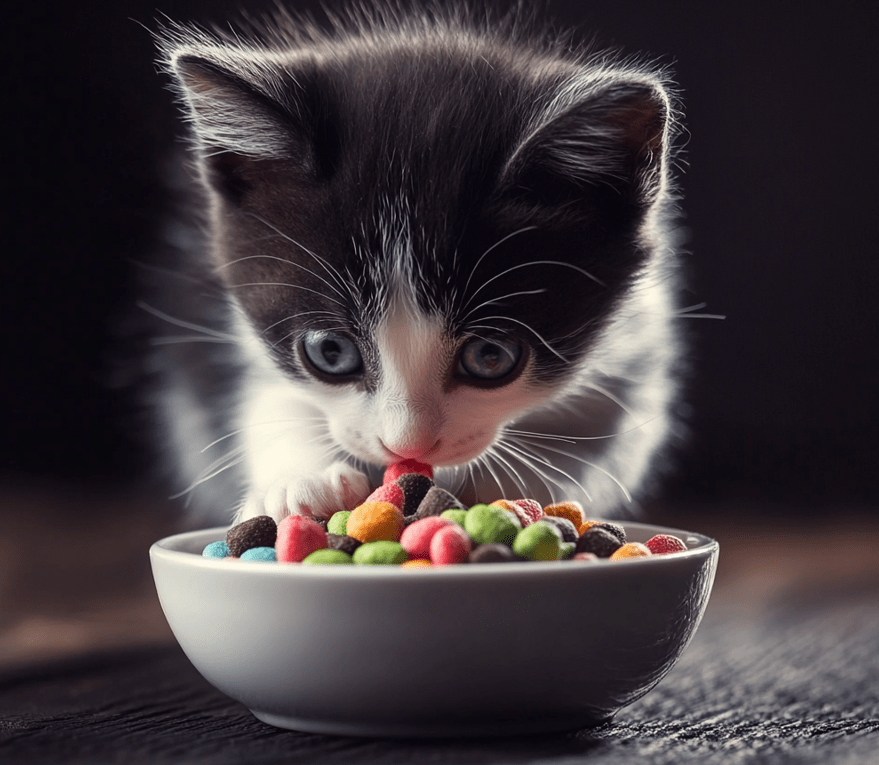
Feeding regular non-organic food to your kitten can be extremely dangerous as it contains some toxic ingredients which are usually an essential part of many commercial cat foods. Such ingredients are unhealthy additives, mycotoxins and the potential to be contaminated with glyphosate. According to that and other investigations of pet food by the Environmental Working Group (EWG), such contaminants can make ingestion of some foods dangerous to cats, even when their nutritional value remains intact.
So, a lot of non-organic cat foods include artificial preservatives that are known to be carcinogenic in many studies. In addition, the non-organic grain by-products used in these foods pose risks of being moldy, causing mycotoxin contamination which can lead to serious liver and immune system problems for cats.
However, it should be noted that unnatural foods aren’t always bad for you. Even some of the good non-organic brands make food that is nutritionally complete and recommended by vets.
Key Considerations for Choosing Organic Kitten Food
If you choose organic kitten food, it needs to meet the nutritional standards of growing cats as determined by organizations like AAFCO and WSAVA.
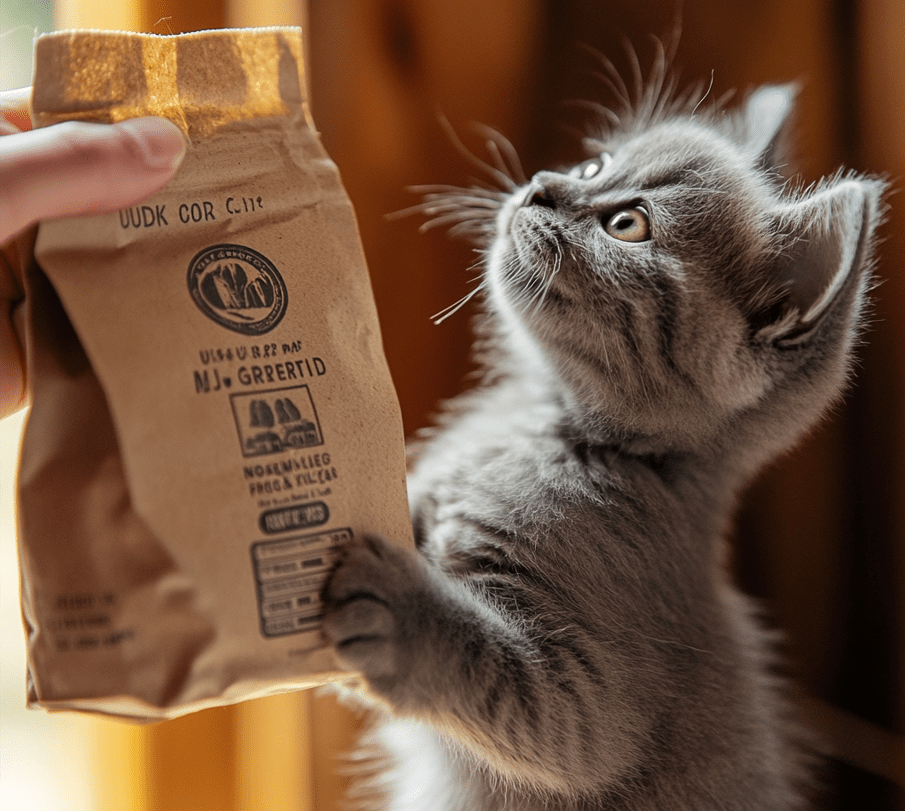
1.Organic Certification Criteria: Make sure that the organic kitten food meets certain organic certification standards. Certifications such as USDA Organic or Non-GMO Project Verified are important because it means that the nutrients in those certifications have been proved and the food safety standards too.
2.Ingredient Quality: Many organic kitten food lists as their first two ingredients from a high-quality source of animal-based protein, such as chicken, turkey, fish, lamb or pork. The food should be by-product and filler free (such as corn and soy — one of the biggest allergens) and ideally adhere to veterinary guidelines.
3.Adherence to FDA Guidelines: Confirm that the organic kitten food adheres to the standards set by other pet food products. This compliance for safety as well as nutritional appropriateness.
4.Sourcing of Ingredients: You need to have a clear picture about the sourcing of ingredients as this will help you choose adequate organic food for treating your kitten. Watch for allergens in natural elements, as some could cause antagonistic reactions.
Ingredients
The ingredient list is very important in organic kitten food, it impacts the overall health of your pet and nutrition. Because organic sourcing often leads to quality outcomes over the raw volume there are a couple of major reasons for preferring an organic approach. Nevertheless, it is important that the food meets kitten dietary requirements—they are obligate carnivores and should get most of their protein from animal sources.
Opt for natural cat food ingredients avoiding harmful additives, fillers, and artificial flavors in run-of-the-mill store brands by choosing whole, minimally processed components. These are high in sugar and thus may disrupt digestion.
Meanwhile, organic dry cat food provides essentials for proper rapid development and strong immunity that keep your kittens healthy both in their juvenile ages and until they become adults.
Certification
Certification: certification is essential to the manufacture of organic kitten food as it confirms that the product complies with strict organic regulations. Clearly readable ingredient transparency and certification are a safety measure for consumers who would like to know the origin of the ingredients in order to comply with FDA regulations when buying food/not buying treats. Knowing the ins and outs of these certifications will help ensure that the product adheres to the strict guidelines based on nutritional consistency, balance, safety.
Pet owners can rest easy knowing that their kittens are eating certified safe and quality food. They underscore the brand’s dedication to quality manufacturing and ingredient sourcing. In addition, these certifications mean the product complies with stringent standards that ensure environmentally sustainable farming practices are used, ban on harmful pesticides and synthetic fertilizers. They also usually raise the animals in more desirable (humane) conditions, thus improving the quality of food.
Nutritional Balance
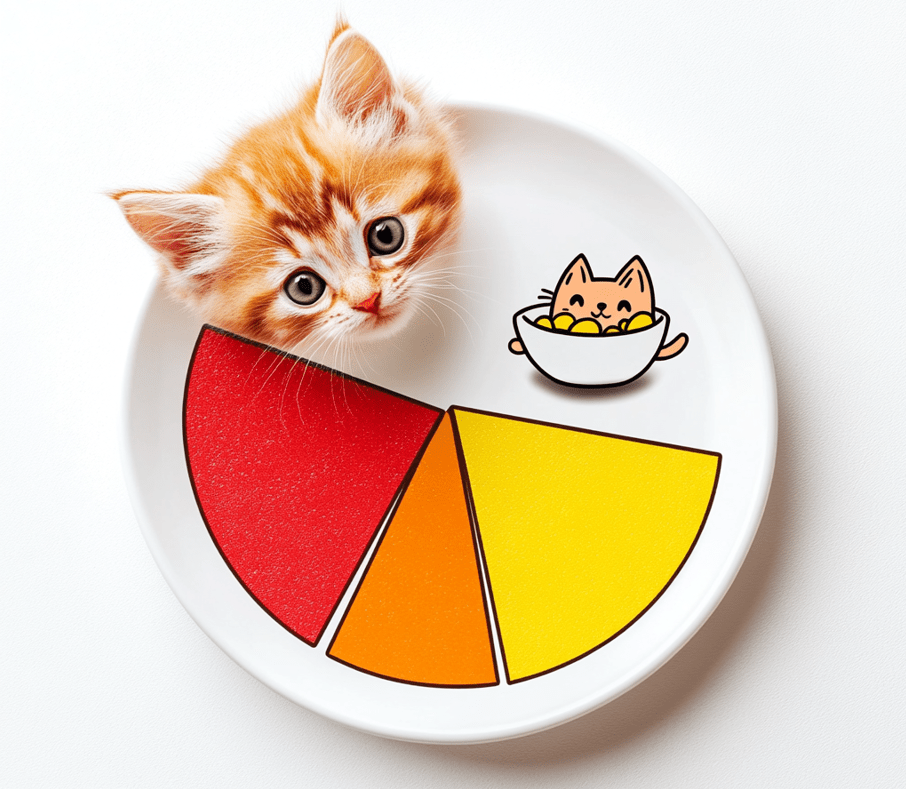
This is a very healthful way of making sure that the kitten get all of their nutrients during this critical period for growth and development. Knowing when to feed your kitten and what is the best food for kittens, based on age-specific dietary needs, ensures that you are making informed nutrition-related decisions relevant to their health. The right organic diet can deliver just that, providing the balance your pet needs to develop and thrive.
This diet should be made up of some essential proteins, fatty acids and a large number of vitamins and minerals. For example, kittens need a protein-rich diet to fuel their muscle growth and keep up their energy levels. Higher-Quality Protein: Organic brands like chicken and fish tend to have less fillers.
Micronutrients such as taurine, which are necessary for healthy vision bone development. Choosing organic means that pet parents can feed their kittens a diet devoid of artificial preservatives and toxins, which benefits both immediate health as well as long-term health. It is important to keep in mind, however, that organic diets can become imbalanced if not formulated correctly. As always, consult with veterinary assistance when altering your pet’s food.
So while organic kitten food may provide some benefits, it is crucial that animal-sourced proteins and correct nutritional balance for kittens are not forgotten in the process. The most important thing to concentrate on is what diet is best for your cat. In case food is organic or not it needs to be properly handled and stored in order to prevent spoilage and contamination. Also, do not fall into the mind trap of putting human dietary tastes onto your kitten; you should always keep in mind the health and identity of your cat when making diet selections. Similarly, exposure to toxic substances is linked with allergies and food intolerance, and increases the risk of nutrient deficiencies associated with impaired immunity and growth.

